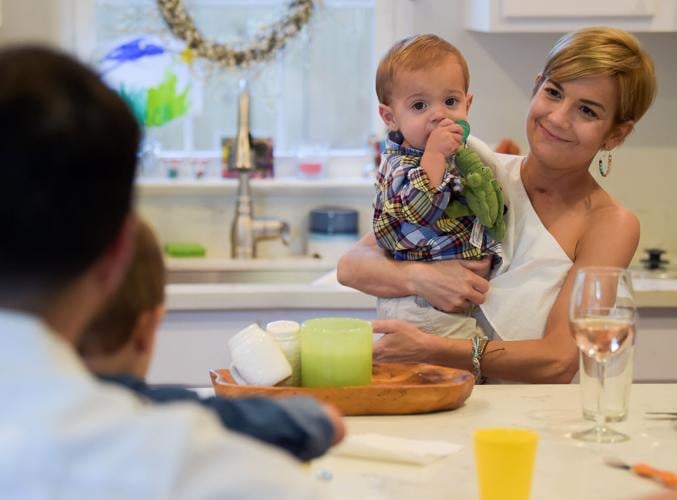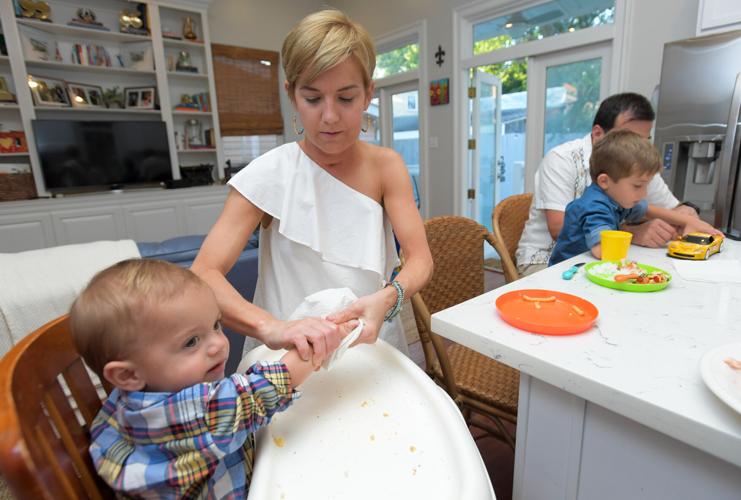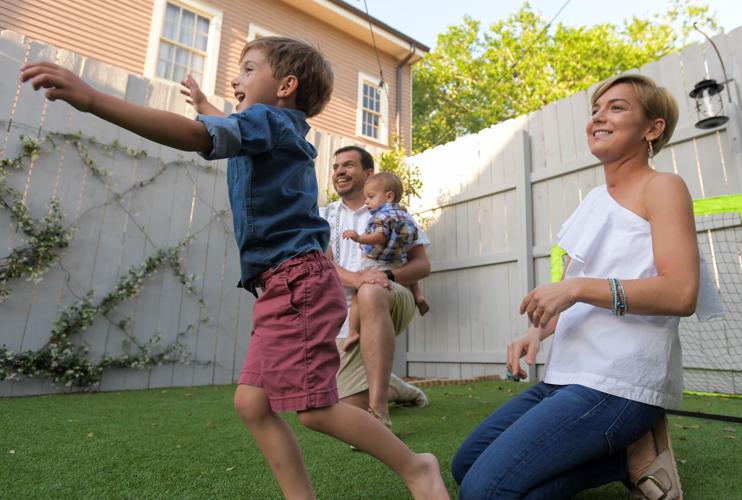In mid-October, the doctor called.
I was in the park with my two young sons, giving 15-month-old Julian his bottle and watching Santiago, 4, zip down a slide. Over the phone came the words I never thought I’d hear: "You have cancer."
That night, I stood in the kitchen with my husband Jose, trying to make sense of the news and prepare myself for the months of physical and mental distress that would follow.
But that’s not where my story begins.
A trouble spot
Back in May 2020, I noticed a very slight pain in the back of my mouth. I thought I had bitten my tongue and figured it would heal.
When it was still there a few weeks later, I assumed it was a stubborn ulcer caused by stress — specifically, the stress of being quarantined with an infant and a toddler, while my physician husband worked the front lines of the coronavirus pandemic.
Once summer arrived, the sore was merely a nuisance I noticed every now and then — mostly if I had been talking all day or eating spicy food.
But when the pain was still there in October — now joined by a sore throat — I scheduled an appointment with an ear, nose and throat doctor. I brought Julian with me, thinking I would be in and out, equipped with a prescription.
I bounced my baby on my knee as the ENT peered into my mouth and then told me with unmistakable concern in his voice that he’d like to biopsy the sore right away — even if it meant having me drop by after office hours.
Eager to rule out anything serious, I said that was fine.
So the following day, he removed a tiny piece of my tongue for diagnostic evaluation. A week later, he revealed that the sore was not an ulcer after all; it was a squamous cell carcinoma — a type of cancer that can develop almost anywhere in the body.
A tough journey
I was shocked. I’m 36, and I don’t have any risk factors linked to oral cancer. But I accepted the verdict and began my fight.
I had 40% of my tongue and 65 lymph nodes removed during an eight-hour operation. Since my throat was so swollen, the surgeons made a hole in my neck — a tracheostomy — to help me breathe. But despite all of this, a post-pathology report revealed that cancer had already spread to one of those lymph nodes.
So I then endured 30 sessions of radiation and six sessions of chemotherapy. I lost my ability to taste and talk. I could barely swallow. For several weeks, I was totally dependent on a feeding tube.
I dropped 15 pounds from my 100-pound frame. I was tired, weak and nauseated. I felt like I couldn’t take care of my kids. I cried.
In short, I went through hell and back, and painfully witnessed my loved ones — my family and friends — suffer with worry along the way.
They were always there for me. Santiago even gave me a stuffed lion — a “lovey” to sleep with — so that I could stay brave. They helped me cross the finish line.
Just bad luck?
Nearly three months post-treatment, I’m finally beginning to feel like myself again. A recent head and neck scan revealed that I no longer have cancer.
So I want to remind everyone that cancer does not discriminate — even cancers associated with certain lifestyles. Doctors say that oral cancer can be caused by years of smoking and HPV, for example, but my doctor ruled out those risk factors.
Squamous cell carcinomas can be caused by genetic factors, which do exist in my family, and excessive sun exposure. Heavy drinking can also increase a person’s chance of developing cancer, and I’ll be the first to admit, I do enjoy my wine!
But at the end of the day, my doctor doesn’t know why this happened. He literally said it was “bad luck,” and something he sees a few times a year. He also said instances of oral cancer in patients with little to no risk factors are increasing; he does not know why.
All I know is that no one deserves this.
Early detection saves lives
According to The Oral Cancer Foundation, an estimated 54,0001 new cases of oral cancer will be diagnosed this year.
“Of those individuals, 43-percent will not survive longer than five years, and many who do survive suffer long-term problems, such as severe facial disfigurement or difficulties with eating and speaking," the Foundation says. "The death rate associated with oral and oropharyngeal cancers remains particularly high because the cancers routinely are discovered late in their development.”
The foundation also says that exams by an oral health professional remain the best way to detect oral cancer in its early stages.
Based on the size of my tumor, my doctor believes he detected the cancer in its infancy, and that I have a strong shot of putting this behind me.
I still worry about the cancer returning, however, and I probably always will. I’m self-conscious about my scars and my lisp. My taste buds are out of whack, and I have trouble chewing food.
But I’m also more talkative than ever, because I’m thrilled to be alive. I’m quickly regaining the weight I’ve lost, as well, because I’m always hungry for more.
And I still sleep with a lion lovey.
Suzanne Pfefferle Tafur is a writer for The Advocate/Times-Picayune/NOLA.com. She lives in New Orleans.
For nearly 40 years, Metairie Park Country Day School has offered a dynamic summer program with visual and performing arts, culinary arts and…
Lisa and Thomas Keiffer have sweet memories (quite literally) of visiting Waynesville, North Carolina, with their six children.
Spring has sprung. And in New Orleans, it tends to move quickly — especially in terms of the weather. So make the most of it while you can.






